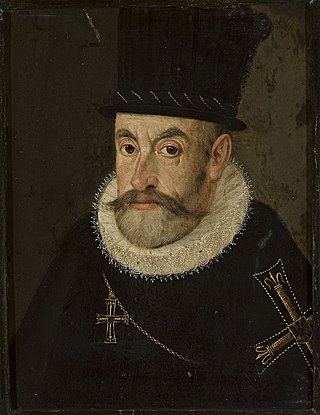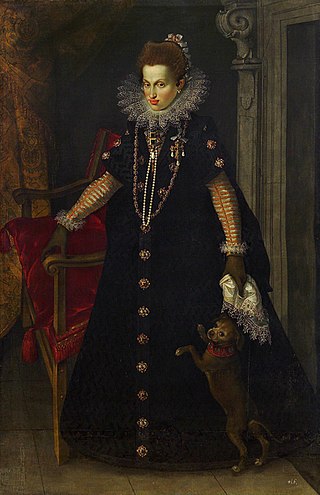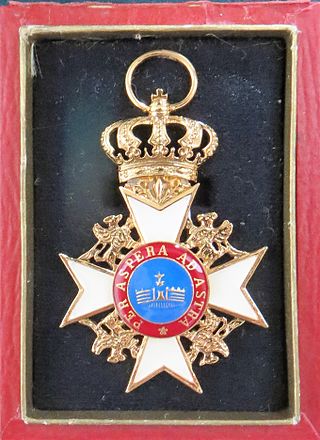
The Teutonic Order is a Catholic religious institution founded as a military society c. 1190 in Acre, Kingdom of Jerusalem. The Order of Brothers of the German House of Saint Mary in Jerusalem was formed to aid Christians on their pilgrimages to the Holy Land and to establish hospitals. Its members have commonly been known as the Teutonic Knights, having historically served as a crusading military order for the forced conversion to Catholicism in the Holy Land and the Baltics during the Middle Ages, as well as providing military protection for Catholics in Eastern Europe.

Ferdinand III was from 1621 Archduke of Austria, King of Hungary from 1625, King of Croatia and Bohemia from 1627 and Holy Roman Emperor from 1637 until his death in 1657.

Maximilian III of Austria, briefly known as Maximilian of Poland during his claim for the throne, was the Archduke of Further Austria from 1612 until his death.

Bad Mergentheim is a town in the Main-Tauber-Kreis district in the German state of Baden-Württemberg. It has a population of around 23,000. An officially recognized spa town since 1926, Bad Mergentheim is also known as the headquarters of the Teutonic Order from 1526 until 1809.

Archduke Leopold Wilhelm of Austria, younger brother of Emperor Ferdinand III, was an Austrian soldier, administrator and patron of the arts.

Maria Anna of Bavaria was a German princess, a member of the House of Wittelsbach by birth and an Archduchess consort of Inner Austria by marriage.

The Grand Master of the Teutonic Order is the supreme head of the Teutonic Order. It is equivalent to the grand master of other military orders and the superior general in non-military Roman Catholic religious orders. Hochmeister, literally "high master", is only used in reference to the Teutonic Order, as Großmeister is used in German to refer to the leaders of other orders of knighthood.

Heinrich von Hohenlohe was the seventh Grand Master of the Teutonic Order, serving between 1244 and 1249. He was the son of one of the richest and most powerful feudal lords in Württemberg and had four brothers and one sister.

Gottfried von Hohenlohe was the 14th Grand Master of the Teutonic Order, serving from 1297 to 1303.

Johann von Tiefen was the 35th Grand Master of the Teutonic Knights, serving from 1489 to 1497.

Anton Victor, Viceroy of Lombardy–Venetia was an Archduke of Austria and a Grand Master of the Teutonic Knights. He was also briefly the last Archbishop and Elector of Cologne and Prince-Bishop of Münster before those territories were secularised in 1803.
Bishops of the Wrocław Bishopric, Prince-Bishopric (1290–1918), and Archdiocese.

Maximilian Ernest of Austria, was an Austrian prince member of the House of Habsburg and by birth Archduke of Austria.

The House Order of the Wendish Crown was an Order of the House of Mecklenburg, jointly instituted on 12 May 1864 by Grand Duke Friedrich Franz II of Mecklenburg-Schwerin and Grand Duke Friedrich Wilhelm of Mecklenburg-Strelitz.

Ellingen Residence is a Schloss in the Bavarian town of Ellingen, Germany.

Mergentheim Palace is a historic building located in Bad Mergentheim, Germany. The palace was first a castle, built in the early Middle Ages as the seat of the Taubergau, but then became a Teutonic possession in 1219, and then seat of the Mergentheim Commandery. The castle became the residence of the Grand Master of the Teutonic Order in 1527 and remained the headquarters of the Order until 1809.

Ludolf König von Wattzau, sometimes referred to as simply Ludolf König in English translations, was the 20th Grandmaster of the Teutonic Order, ruling the order's state in the Baltics from 1342 to 1345.

Georg Hund von Wenkheim, or Georg Hundt von Wenkheim was the 40th Grandmaster of the Teutonic Knights, reigning from 1566 to his death 1572.

Heinrich von Bobenhausen was the 41st Grandmaster of the Teutonic Knights, reigning for close to two decades from 1572 to 1590.


















